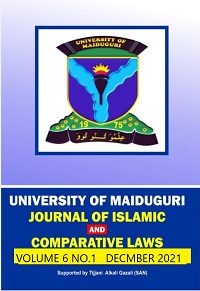An Examination Of Effects Of Options (khiyārāt) In Determining Mutual Consent (taraḍī) In Commercial Transactions Under Islamic Law
ABSTRACT
The foundation of contract in Islamic law is the consent
(riḍā) of the contracting parties. This is decreed by the
verse in the Glorious Qur’an, surah al-Nisa which says that
“O you, who believe, devour not your property among
yourselves by unlawful means except that it is trading by
your mutual consent.” The normal way of consenting to
commercial contracts is through offer and acceptance by
the contracting parties. Similarly, Islamic law provides
khiyārāt (options), some of which are created by parties to
the contract themselves, while others are inherent in the
contract. Options (khiyārāt) are regarded as the right
ordained for the contracting parties to either accomplish or
dissolve a contract. Therefore, using the doctrinal research
methodology, the research examined options (khiyārāt)
with a view to assessing its impact on the determination of
the Mutual consent (Taraḍῑ) of the contracting parties
under Islamic law. The research found that apart from offer
and acceptance in a contract, the parties can use khiyarat
(options) as a mechanism for the determination of the
consent of the parties in the contract. The research
recommended that: parties to a contract can utilize or insert the mechanisms of khiyarat options in a particular contract
as another way of ascertaining the consent or otherwise
There are no reviews for this Journal.
About the Journal
About
Editorial Team
Curent issues
Archive
DOWNLOADABLES
Guide for contributors
Authors Response Form
Manuscript review Form
Make a Submission

